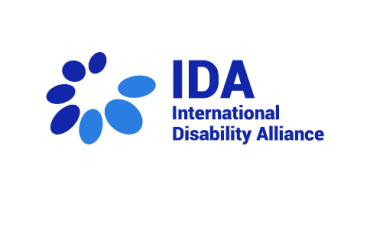Welcome to the weekly newsletter on the 30th Session of the Committee on the Rights of Persons with Disabilities
Week 2, 11th to 15th March
The 30th Session of the Convention on the Rights of Persons with Disabilities Committee meeting will take place from Monday, March 4th to Friday, March 22nd at the UN headquarters in Geneva, Switzerland. You can follow all the sessions on the UN WebTV platform here.
The second week of the 30th session of the CRPD Committee
The second week of the 30th session of the Committee on the Rights of Persons with Disabilities ended on 15th March 2023. The week included the State reviews:
- The review of Sweden
- The review of Azerbaijan
- The review of Costa Rica
Reviews of Sweden, Azerbaijan, Costa Rica, and Nicaragua 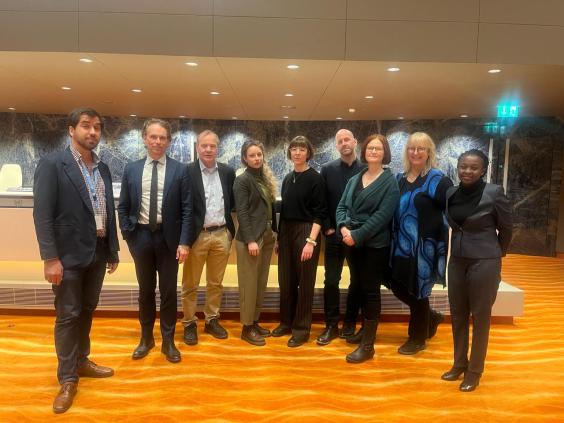
Another key area touching several CRPD articles related to legal harmonization and the insufficiency of protection against discrimination by the Swedish Discrimination Act, including confusing concepts such as "inadequate accessibility" which do not meet the standards of protection enshrined in the CRPD and explained in detail in General Comment no. 6 on Article 5 CRPD (Equality and Non-Discrimination). In connection to mental health care, great concern was caused by the replies by Sweden explaining the use of electroconvulsive therapy or "electroshock" on persons with psychosocial disabilities under the Compulsory Psychiatric Care Act, a practice which is clearly against the Convention, and which should be urgently eradicated.
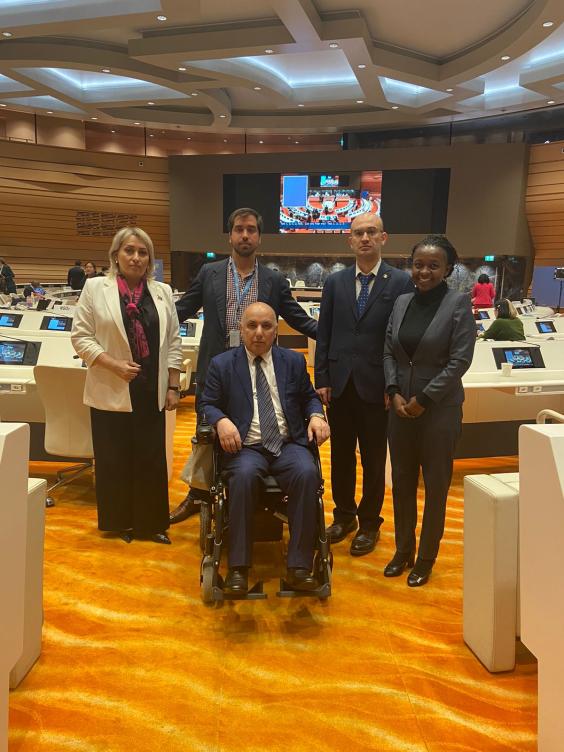
On Tuesday, 11th March (afternoon) and Wednesday, 12th March (Morning), the CRPD Committee reviewed Azerbaijan. The CRPD Committee raised several concerns and questions and sought clarification regarding all articles of the Convention. Of particular concern was the absence of effective and meaningful consultation of organizations of persons with disabilities (OPDs) and the lack of adequate financial support for OPDs. The CRPD Committee further noted that despite the 2014 recommendations, the State was far from guaranteeing accessibility including transportation, information, and built environment, regretting in particular the delayed adoption of Rules to facilitate the implementation of the Urban Planning and Construction Code and the lack of recognition of sign language as a national language.
On education, the Committee noted that while Azerbaijan had initiated a pilot project on inclusive education, this program targeted only 200 learners representing less than 1% of about 46,000 children with disabilities in need of education and whose parents are forced to homeschool or enroll in special schools. On institutional framework, the CRPD Committee raised questions on the delayed establishment of an independent monitoring mechanism noting that although the Ombudsman office had been mandated to guide the process, nothing much had been achieved.
The CRPD Committee addressed numerous questions to the State delegation reflecting its concern for the potential weakening of disability-related public bodies and consequently of the disability agenda within public policy. In this sense, the Committee inquired about projects to merge the National Council of Persons with Disabilities (CONAPDIS, for its acronym in Spanish) with other public bodies into one public office, diluting its relevance and weakening its functions. Legal protection against discrimination based on disability and other grounds of discrimination remains weak in Costa Rica. Draft bills remain blocked within Congress. The CRPD Committee asked very clearly if the State was considering moving forward -as it should- with the draft bill 20174 "Frame Act to prevent and sanction all forms of discrimination, racism, and intolerance," ensuring the improvements from a CRPD perspective were included in the parliamentary process.
The CRPD Committee asks, among many issues, about the at least 27 enforced disappearances during the 2018 crisis and about the 526 femicides between 2012 and 2019, referred to in CEDAW's recent Concluding Observations, about which it is not known if and how many persons with disabilities might have been affected. Moving to clear CRPD issues, the Committee asked if the State intends to establish an independent Convention monitoring mechanism in line with Article 33(2) CRPD. Finally, the Committee called the State to reform its certification and disability card system to ensure that no person with disability is excluded from accessing rights!
Click for the videos of the public meetings related to Sweden, Azerbaijan, Costa Rica and Nicaragua
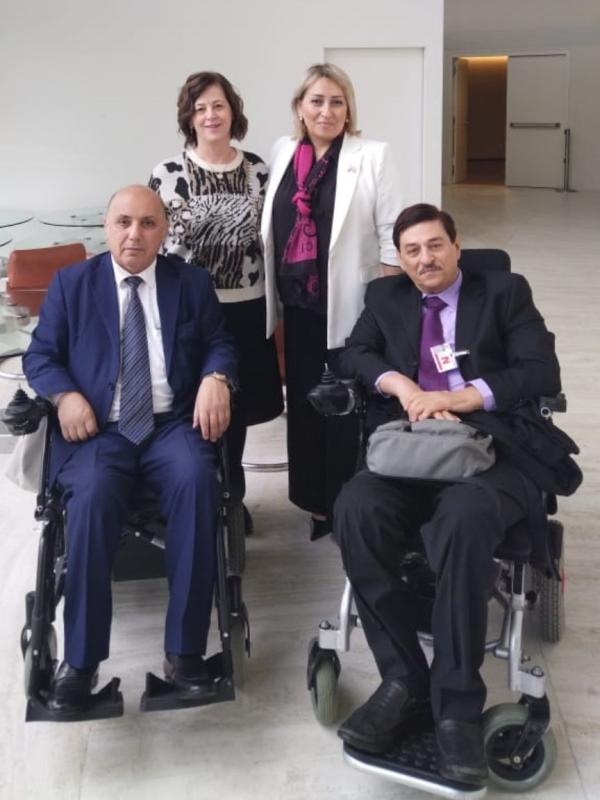
Mr. Nawaf Kabbara, President of the International Disability Alliance, came to Geneva to attend the 2nd week of the CRPD Committee’s session and engage in activities and events in the context of the 55th session of the Human Rights Council. Mr. Kabbara was glad to meet and discuss current concerns and issues on the implementation of the Convention on the Rights of Persons with Disabilities at the national level with representatives from the Swedish Disability Rights Federation, members of the European Disability Forum, and the Union of Disabled People Organizations (UDPO) of the Republic of Azerbaijan.
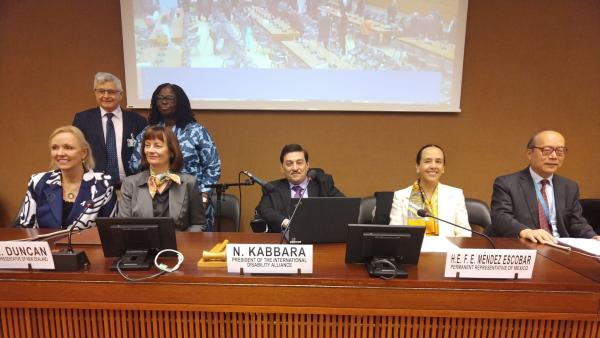
See related posts on IDA’s Website:
The International Disability Alliance continued to provide technical, logistical, and financial support to persons with disabilities from Azerbaijan, Costa Rica, and Sweden to engage with the CRPD Committee members in person and more effectively. Representatives of organizations of persons with disabilities took the opportunity to update the CRPD Committee on progress at the national level, gaps, priorities, and concerns ahead of the review of the State. They also took advantage of this crucial process to establish relationships with Committee members for future engagements and collaboration
“The Convention has a particularly important role in building an inclusive society in Azerbaijan, and people with disabilities have already benefited from it. It is noteworthy that the firm positions of the CRPD Committee members and speakers will instigate the State to take more realistic steps. The recommendations that the CRPD Committee will send to Azerbaijan will create the basis for serious changes in the field of disability”.
On behalf of the Azerbaijan Union of Organizations of Disabled Persons, Davud Rahimli and Jamila Abdulova
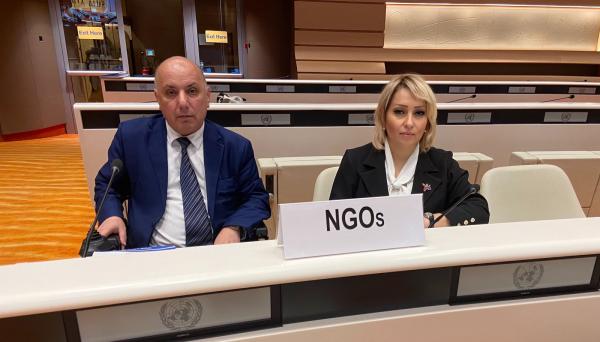
SWEDEN
"Swedish OPDs have been waiting impatiently for the second review. This time –10 years after the first review– we hope the dialogue will be a wake-up call for the State to learn to apply the human rights-based approach to disability. The support from IDA staff in Geneva to prepare for the review and make the most of our advocacy in Geneva has been invaluable. We need to get back to basics, by learning about human rights standards and how we can advocate to apply them making use of general comments and recommendations from the CRPD committee. This is something we all have in common in OPDs around the world. The opportunity to meet the committee in Geneva is very rare, this is an opportunity for us to learn and integrate the CRPD into our daily national advocacy."
Mr Nicklas Mårtensson, President of the Swedish Disability Rights Federation
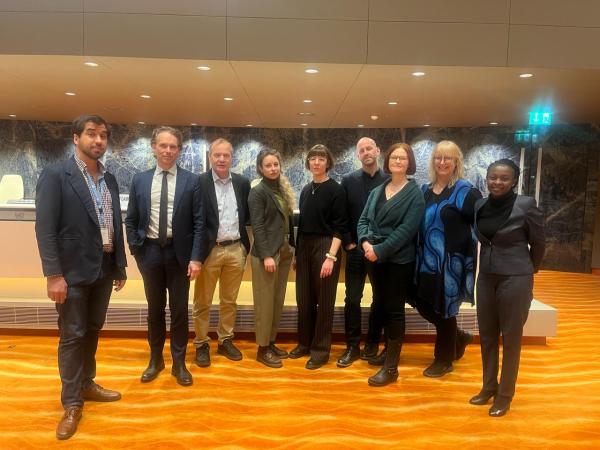
COSTA RICA
“Having the support of IDA to represent the Costa Rican delegation on behalf of civil society has been very important. Not only was I able to present the alternative report personally, but I was able to brief directly members of the Committee providing them with inputs on CRPD implementation in Costa Rica. We are very grateful for all the technical, logistical, and financial support provided by IDA and its friendly staff”.
Wendy Barrantes, on behalf of organizations of persons with disabilities from Costa Rica
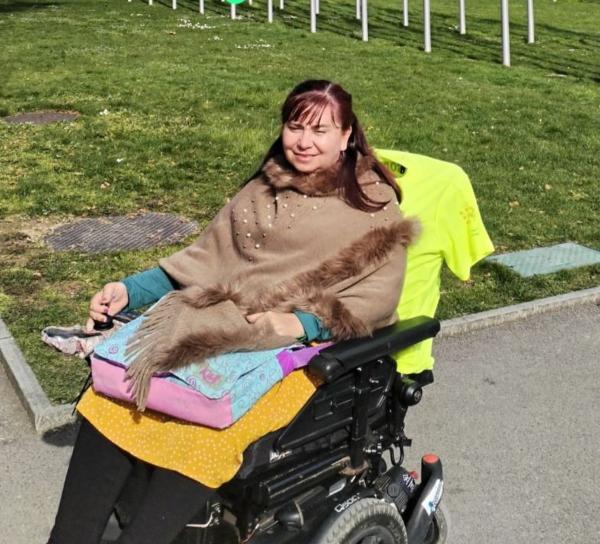
What’s next this third week of the CRPD Committee review?
During this third week which begins today, March 18th, the CRPD Committee will hold dialogues on the follow-up to inquiry reports of Spain and the United Kingdom of Great Britain and Northern Ireland.
The Committee will later retreat into private meetings to adopt and publish Concluding Observations of Azerbaijan, Bahrain, Costa Rica, Kazakhstan, Nicaragua, Sweden, and Zambia.
The formal closing of the session, including announcements of decisions taken, will take place on Friday afternoon, around 5 PM CET.
For more information on the session, including reports by States and organizations of persons with disabilities, visit the CRPD Committee website.
Follow us live on Twitter for the newest updates from the sessions @IDA_CRPD_Forum!
